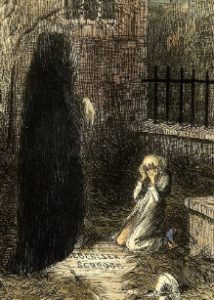In todays reading, Jesus prays for us. Sitting around the Passover table with his disciples for the last time, Jesus knows Judas’ betrayal is imminent. He knows the cross is but hours away. And so, as a last act before he is taken away, Jesus offers prayer for the men and women surrounding him. But not just for them – beyond them. He prays on behalf of those with him and those who “are believing.” It’s a present translation meaning those who believe in his time and in all times. Jesus is praying for us.
And we surely need it.
I find it interesting that Jesus doesn’t pray for the church. He prays for those who have faith – for those who believe – so that they know God sent him. Back a few chapters in John 10, Jesus gives us this little tidbit: “I have other sheep that are not of this sheep pen. I must bring them also. They too will listen to my voice, and there shall be one flock and one shepherd.” In our passage today, Jesus prays for unity, over and over, that we may be one – and it’s not specific to the church. It’s for these other sheep. It’s for the one’s believing.
The slave girl. We don’t get her name. Luke, the writer of Acts, doesn’t think it important enough to give us. He tells us about Lydia a few verses back because she’s a wealthy, influential woman. So of course, she gets named. Later in our story, we don’t get the jailer’s name, but we get to know him and his family. Luke tells us what happens to him. And Luke names the heroes of our story, Paul & Silas. But not the slave girl. All we know of her is that she has a spirit on her that speaks the truth.
There’s a lot of imagery in our reading today of slave and free, of imprisonment and release, of desperation and salvation. There’s so much richness there, it’s easy to miss the other imagery of power and privilege, wealth and voice, abandonment and deceit. We love the picture of Paul and Silas, shackled in the innermost cell, singing hymns to God and the other prisoners. But what of the slave girl’s shackles. When do they fall away?
I tell you – it will take more than an earthquake to free her.
The term used for the slave girl is the Greek word, “παιδίσκην.” It literally means “little girl.” And lest we think she is a child, the term was also used in a demeaning way to adult slaves, much like adult men were called “house boys” to denote their low status. So we don’t know whether she is a child or an adult, only that she has a gift – a real gift – to divine the truth; and she has masters who exploit that gift for profit.
Luke tells us that Paul and Silas, after discerning they should go to Macedonia, go through Philippi to get there. They very wisely meet with Lydia, a wealthy woman who deals in very expensive purple cloth and who runs her own household. She converts to Christianity and makes intros into Philippian society. They stay in her home, meeting with other believers there. And they travel back and forth from Lydia’s home to the place of prayer by the river to preach. It is on these trips they encounter the slave girl.
She isn’t discreet. In fact, she’s a problem. For days as they trek back and forth from Lydia’s house to the river, the slave girl leaves her place in the market to find them and follow them, shrieking the entire time, “These men are slaves of the most high God, who proclaim to you a way of salvation.” She does this so often and so loudly, Paul gets annoyed – really annoyed. He turns on her and expels the spirit.
There are a lot of sermons and commentaries out there about Paul’s beneficent act of freeing this slave girl from her demon and from exploitation at the hands of her masters. But I can’t help but note Paul’s motives. They aren’t exactly heroic. You see, like Paul, the slave girl proclaimed a way of salvation. And he silenced her because he was annoyed. This wasn’t a healing. It was a slap-down.
I know it’s hard to see shortcomings in our heroes, especially in the fathers of our faith, but I pray we can look into our scriptures and find where we have fallen just as often as where we have prevailed. There are texts of terror in our canon: Jeptha and his daughter, the rape of Tamar, the tearing apart of the Levite’s concubine, just to name a few. We need to look at these texts with open hearts and open eyes, not just the stories themselves but the men and women who wrote them, edited them, and told them to a young church desperate to survive. They had motives, too.
Paul and Luke are products of their time. Paul didn’t free her because he had a moral obligation to end slavery. In fact, the book of Philemon is Paul returning a slave to his master. Paul accepts slavery as a part of his everyday life, no matter the moral issues there. Paul doesn’t heal her from an evil spirit – the spirit is never mentioned as being demonic. The slave girl is annoying and she’s preaching on their turf. And for Luke, our writer, this slave girl is a plot point in a story to get our hero into jail where the real action takes place. She’s nothing more.
What happens to her? Let’s look at this realistically. After what Paul did to her, she is without her gift and now worthless to her masters. They could sell her for a loss, put her to work as a laborer or house slave, or they could simply release her. But to what end? Alone, without skills, and unattached to a brother, father, son, or husband, the slave girl is without any means of making a living outside of prostitution. Where is the follow-through from Paul? Had he realized or cared what happened to the slave girl, he could have purchased her and brought her with him on his travels. He could have taken her to Lydia, who was wealthy enough to take her in. He could have done anything better than just leaving her to the streets.
We are a lot like Paul here. We get so annoyed with the ills of our society, the way it’s broken – homelessness and addiction, violence and injustice. We want a quick fix. Just give everyone guns. That will fix it. Teach abstinence. That will fix it. Throw addicts into prison. That will fix it. Lock children in cages. That will fix it. If “they” aren’t working, God-fearing, productive members of society, take away all the safety nets and let “them” fend for “themselves.” That will fix it.
But it won’t. And we know it. It’s a form of denial. If the annoyance disappears, the problem disappears. Just like the slave girl in the story. But here’s the thing – people, deep down in their hearts, know the truth. They prefer the lie because it benefits them.
Our world doesn’t have a simple fix. It’s an intricate, giant, glob of a mess. Enough so, that Jesus prays for us. We can’t just say, “Let go, and let God.” It’s tempting to throw easy solutions at annoying problems, but when we do that we silence the underlying prejudices and fears that feed those problems. We try to fix one thing, another pops up. There are no fast and easy solutions. It’s all connected, because the truth is we are all connected.
Jesus prays that we are one. And we are one. One world. One baptism. One faith. When one of us is lost, we are all lost. It’s that simple. And it’s that hard.
What I hope for us is that we talk to one another. What I hope is that we take a hard look and admit to our participation in perpetuating the mess. There are lives at stake and those lives matter. We aren’t the hero of every story. Paul looks like the hero when he and Silas sing in shackles. But how hard is it to sing in jail, when you know your citizenship is the key to your release?
The slave girl had no such recourse. And yet she proclaimed the Gospel too.
So how do we fix this mess? I have no idea. The solution doesn’t come from me, or any one person. This much I know – it’s going to take turning our hearts from referring to them and their problems, into owning our world as us and our problems. When we repent living the lie of “us” and “them,” when we seek relationships with each other on equal ground, when we stake our economy and our future not on the subjugation of others, but on the truth that brown children and white children have the same value – we’ll come closer to solving our problems. And not a day sooner.
Until then, the slave girl continues to cry in the marketplace, pointing at us annoyingly, showing us to a way to salvation. The question is – will we listen?
(Sermon preached on John 17:20-26 and Acts 16:16-34 at The Hermitage on June 2, 2019)



Average Rating